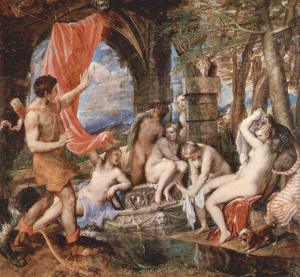Based upon a story from Ovid’s
Metamorphoses, this ‘pastorale en musique’ tells the tragic tale
of the unfortunate eponymous hunter who unwittingly stumbles upon the secluded
bathing haunt of the goddess Diana and her attendant nymphs. He attempts to
conceal himself but to no avail, and he is punished severely for his trespass
by the angry goddess. Diana transforms him into a stag and Actéon is pursued
and torn apart by his own hunting hounds.
It is a fairly lightweight piece, with some dramatic variety and pleasing
emotional contrasts; Charpentier’s score is typically elegant, with regard to
melodic phrasing, and rhythmically robust, most especially in the bucolic
scenes enlivened by dance-like instrumental forms and textures. Here, the
assembled soloists emerged from the one-per-part chorus, deftly moving to the
forestage at appropriate points, skilfully diverting and sustaining the
audience’s attention. All produced a fairly idiomatic pronunciation of the
French text; but, while a graceful phrasing of the exquisite yearning phrases
was achieved, there was little attempt to render the authentic ornamentation of
the French baroque style.
Charpentier, an accomplished tenor, probably composed the title role for
himself. Here, Ed Lyon, singing confidently and with obvious commitment to the
drama, produced a beautiful youthful tenor, surely sufficiently warm and tender
to melt even the most glacial goddess’s heart. If Lyon’s upper register
sometimes lacked a little weight and substance, the touching vulnerability of
his tender pianissimo in his transformation scene more than
compensated; and, he exalted Diana’s loveliness with wondrous awe. His
transformation aria was followed by a trio sonata for violins and continuo,
exquisitely played by violinists Kati Debretzeni and Huw Daniel supported by
Reiko Ichise on viola da gamba.
As Diana, Claire Booth sang with focus and clarity, but while she was
admirably reliable in pitch and tone, at times she seemed a little too forceful
for the role. The heart-rending action was rudely interrupted by the
interjections of Juno (Hilary Summers), who confesses that, in a jealous rage
aroused by Jupiter’s infidelity, she has brought about Actéon’s death.
Summers enjoyed the extravagant dramatic aspects of the part, projecting
powerfully from the Wigmore Hall balcony; but, her tone was rather strident and
somewhat undid the mood of elegiac pathos.
Ciara Hendrick and Elizabeth Weisberg completed the line up of competent
soloists; the seven singers joined to form a chorus characterised by neat
ensemble, and clean, airy textures. After Actéon’s death, his hunting
companions lament “the beautiful days cut short” of this invincible hero
“in the springtime of his age”; unfortunately some poor flute intonation
unsettled the overall tuning at the close of what had been an appealing and
convincing performance of an attractive and stirring score.
Charpentier’s Actéon is an unusual yet complementary pairing
with Purcell's Dido and Aeneas, the latter being inconveniently
succinct and requiring a partnering work. Yet, Charpentier’s score preceded
Purcell’s by only five years, and there are many affinities between them, not
only of musical style - Purcell’s dance-textures and rhythms often sound
distinctly French - but also of situation and mythic context, for
Charpentier’s narrative is also related by one of Dido’s ladies-in-waiting
in the aria “Oft she visits this lone mountain” in Purcell’s opera.
If Charpentier’s pastoral drama is ultimately rather frivolous, Purcell
inspires considerably greater emotional weight and intensity. With Anna
Stephany, the advertised Dido, indisposed, Susan Bickley stepped into the role
at short notice, presenting a controlled, poised interpretation of regal
bearing, betrayal and distress. If her early arias seemed overly guarded and
reserved, a little lacking in affective gesture, by the closing lament her
noble dignity was firmly established and her portrayal deeply poignant.
Claire Booth was a deliciously rich-toned Belinda, and Hilary Summers’
vocal exaggerations were more apt for the disconcerting devilry of the
Sorceress. As Aeneas, baritone Marcus Farnsworth, made as much as is possible
of the slim part.
Christian Curmyn led the ensemble in typically controlled and elegant
fashion; perhaps his rendering was a little too restrained, more suitable for
Charpentier’s relatively inconsequential drama, than for the emotional peaks
and troughs of Purcell. There was grace and discipline, but few musical or
dramatic surprises; in the Purcell especially, the emotional peaks were
somewhat muted, the protagonists a little too self-possessed. Even in the
Charpentier the dances lacked spontaneity; one longed for a looser rein which
would permit the instrumental players the necessary freedom to inject an
improvisatory quality. Purcell’s drunken sailors and grotesque witches were
distinctly reserved.
Although we don’t know the circumstances and venue of the first
performance of Charpentier’s Actéon, its brevity and intimacy, and
the courtly ambience of the French baroque idiom, suggest a private setting.
Similarly, while it was once firmly believed that Purcell’s opera was
composed for girls’ school in Chelsea run by dancing master Josiah Priest,
critics now question whether it was not in fact modelled upon John Blow’s
masque, Venus and Adonis, and first performed at court in the 1680s.
Whatever their origins, both works are ideally suited to the intimacy of the
Wigmore Hall, and the Early Opera Group’s thoughtful, if rather conservative,
performance, heightened the grace and eloquence of these elegant, affecting
scores.
Claire Seymour
